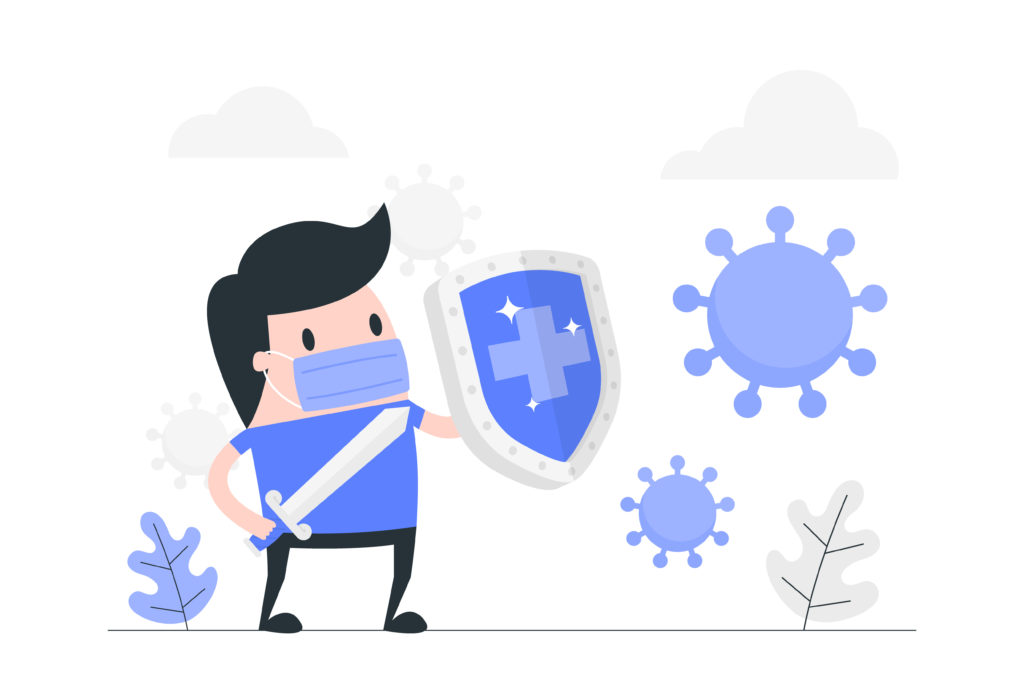As you are a diabetic it is highly likely that your immune system has been compromised and is much weaker than that of a non-diabetic. Thus, you need to strengthen your ability to fight off infections and diseases. There are many ways you can do that.

There are, literally, many, many ways you can go about strengthening your immune system. These approaches can be roughly classified as follows:
- Lifestyle changes
- Food choices
- Dietary supplements
- Herbs
- Essential oils
1] Lifestyle changes to strengthen your immune system
To boost your immune system, one of the first things you need to do is to switch to a healthy lifestyle. That means …
- exercising regularly
- reducing stress
- improving sleep patterns
- cutting down on the booze
- taking personal protective measures
Daily exercise … you need to get off your butt and incorporate as much physical exercise as you have time for into your daily activities in order to strengthen you immune system.
It is a well-known fact that our immune systems get weaker as we grow older … this is called immunosenescence, a gradual deterioration of the immune system.
A study published in Aging Cell in 2018 titled Major features of immunosenescence … are ameliorated by high levels of physical activity in adulthood showed that … for adults aged 55 to 79 and whether or not they have an underlying medical condition such as diabetes … high levels of physical exercise reduce the rate at which immune systems weaken dramatically, though exercise does not prevent it from happening completely.
Stress … to promote your health, you need to minimise your stress levels. Studies show that chronic stress can suppress protective immune responses and exacerbate pathological immune responses.
A study published by the US National Library of Medicine (NIH) in 2014, Effects of stress on immune function, summarised the various effects, good and bad, short-term and long-term stress can have on our lives.
Sleep … you need to make sure that you are getting at least 7 hours sleep a night. When you are not getting enough sleep, your immune system cannot function properly.
A study published in Sleep in 2014, Behaviourally Assessed Sleep and Susceptibility to the Common Cold, found that adults who slept less than 6 hours a night were 4 times more likely to get a cold in comparison to adults who slept for more than 7 hours.
Alcohol … alcohol has an adverse effect on the health of your gut, decreasing immune function and making you more susceptible to infections. In other words, too much alcohol can have a negative impact on your immune system. To retain a strong immune system you should limit your intake to one or two drinks a week maximum.
Personal protective activities … the best way to protect yourself against any deficiencies in your immune system is to undertake activities that protect you from viruses, bacteria and fungi … this means:
- frequent hand washing
- use of hand sanitizer containing at least 60% alcohol
- minimize touching your face … eyes, nose and mouth
- coughing or sneezing into your elbow
- using disposable tissues which you throw away or (preferably) incinerate
- staying out of the way when sick
- seeking medical attention as needed
2] Food and beverages that strengthen your immune system
What you eat and drink can have a very strong impact on your immune system. Here are some with very positive effects on your immune system:
- Green tea
- Bone broth
- Ginger
- Foods rich in vitamin C
- Foods rich in Beta-carotene
Green tea … this beverage contains antioxidant and immunomodulatory properties.
Antioxidants are substances that may protect your cells against free radicals, which may play a role in heart disease, cancer and other diseases.
Free radicals are molecules produced when your body breaks down food or when you’re exposed to tobacco smoke or radiation.
An immunomodulator is a chemical agent that modifies the immune response or the functioning of the immune system.
Because of these properties, green tea works as an antifungal and antivirus agent. Thus, it’ll be helpful if your immune system is compromised. The antioxidants and amino acids in green tea can help your body fight germs … so drink a large cup of good-quality green tea every day. I do.
Bone broth … broth made by boiling bones and connective tissue is another excellent beverage for helping your immune system remain strong. It can be made using cow, chicken or fish bones.
Bone broth supports your immune function by promoting the health of your gut and reducing inflammation caused by leaky gut syndrome. The collagen and amino acids it contains help to seal the openings in the gut lining and support its integrity.
Because the health of your gut plays a major role in the functioning of your immune system, consuming bone broth is an excellent booster food for your immune system.
Ginger … it is believed that the warming effects of ginger help to break down the accumulation of toxins in our organs. Ginger is also well-known for cleansing the lymphatic system.
The lymphatic system is a network of tissues and organs that help rid the body of toxins, waste and other unwanted materials. The primary function of the lymphatic system is to transport lymph, a fluid containing white blood cells that fight infection, throughout the body.
With their immune-nutrition and anti-inflammatory responses, ginger root and ginger essential oil can treat a wide range of diseases. Indeed a report, Anti-Oxidative and Anti-Inflammatory Effects of Ginger published in April 2013 in the International Journal of Preventative Medicine, reviewed the current evidence on the effects of ginger as an anti-inflammatory and anti-oxidative agent and found that ginger has antimicrobial potential and so can help in treating infectious diseases.
Ginger is also known for its ability to treat inflammatory disorders caused by viruses, bacteria and parasites, as well as inflammation created by heat, acid and cigarette smoke.
Thus, it is quite clear that ginger can boost your immune system and should be added to your regular diet.
Vitamin C … foods rich in vitamin C improve the health of your immune system through their antioxidant and anti-inflammatory properties.
An enquiry into the Immune-enhancing role of vitamin C and zinc, published by the US National Library of Medicine (NIH), found that plenty of vitamin C together with zinc can help reduce respiratory infections and shorten the duration of common colds and bouts of bronchitis.
The best foods for boosting your immune system with vitamin C are … citrus fruits (oranges, lemons and grapefruit) … black currants … guava … bell peppers (red and green) … pineapple … mango … honeydew … parsley etc
Beta-carotene … eating foods rich in beta-carotene is better for boosting your immune system than taking it as a dietary supplement. Beta-carotene is a powerful antioxidant … it reduces inflammation and fights oxidative stress.
The greatest sources of beta-carotene are leafy greens and yellow, orange and red fruits and vegetables, including … carrot juice … sweet potatoes … pumpkins … red bell peppers … apricots … kale … spinach … collard greens etc
3] Dietary supplements to strengthen your immune system
You can boost your immune system by addressing nutritional deficiencies with dietary supplements. Here are three supplements that can help immensely:
- probiotics
- vitamin D
- zinc
Probiotics … a probiotic substance or preparation is a live microorganism introduced into the body for its beneficial qualities. Probiotics are good bacteria that help you digest the nutrients that boost the detoxification of your colon and support your immune system.
The human digestive tract is where food is broken down and nutrients absorbed. The walls of the intestines act as barriers, controlling what enters the bloodstream. Small gaps in the intestinal wall (aka tight junctions) allow water and nutrients to pass through, while blocking the passage of harmful substances. Intestinal permeability refers to how easily substances can pass through the intestinal wall.
When the tight junctions of intestinal walls become loose, the gut becomes more permeable, which can allow bacteria and toxins to pass from the gut into the bloodstream. This is leaky gut.
When the gut is leaky, the bacteria and toxins that enter the bloodstream can cause inflammation and possibly trigger a reaction from the immune system. Leaky gut is a major cause of sensitivities to food, autoimmune disease and immune imbalance or a weakened immune system.
Thus, consuming probiotic foods and supplements to resolve this issue can be important. In fact, research published in Critical Reviews in Food Science and Nutrition in 2014 provided detailed information about how probiotics stimulate our immune system.
Vitamin D … a deficiency in this vitamin is associated with increased autoimmunity (your immune system attacking your own healthy cells and tissues) and increased susceptibility to infection. One way to boost your immune system is to rectify a nutritional deficiency such as that.
Research published in the Journal of Investigative Medicine in August 2011 showed that vitamin D works to promote protective immunity. Indeed, numerous studies have associated lower levels of vitamin D with increased infection.
For example, a study conducted at Massachusetts General Hospital covering 19,000 participants (published in 2009) stated that persons with lower levels of vitamin D levels are more likely to report a recent upper respiratory tract infection than those with sufficient levels, even after adjusting for variables such as season, age, gender, and so on.
Zinc … these supplements are often sold as over-the-counter remedies for colds and similar illnesses. A study undertaken in 2003 of the Efficacy of zinc against common cold viruses noted that it can interfere with the molecular process that causes the buildup of bacteria in the nasal passages.
4] Herbs that can strengthen your immune system
At least four herbs can be very effective in boosting your immune system:
- Elderberry
- Astragalus root
- Ginseng
- Echinacea
Elderberry … The flowers and berries and flowers of the elder plant have been used as medicine for thousands of years. Hippocrates, the ‘father of medicine’, used elderberry for its many health benefits, including its ability to fight colds, the flu, allergies and inflammation.
Elderberry has been proven to help treat the symptoms of common colds and flu that are due to viral infections. This suggests that it has the power to boost the immune system.
Indeed, a study published in the Journal of International Medical Research in March-April 2004, Randomized study of the efficacy and safety of oral elderberry extract in the treatment of influenza A and B virus infections, showed that when elderberry is used within the first 48 hours of the onset of symptoms, it reduces the duration of the flu, with symptoms being relieved on an average of four days earlier. Plus, the use of rescue medication was significantly less in those receiving elderberry extract compared with a placebo.
Rescue medication is a medicine intended to relieve symptoms immediately. Rescue medications are most often used for severe allergies, for asthma, or for migraines … aka quick-acting medication and fast-acting medication.
Astragalus root … this root has been used in Traditional Chinese Medicine for thousands of years as an adaptogen. An adaptogen is a natural substance that helps the body adapt to distress.
Indeed, the astragalus plant has a very long history as an immune booster and disease fighter. Though it has not been studied much, in recent years this member of the legume family has been coming under increased scientific scrutiny.
A review published in the American Journal of Chinese Medicine in 2016, Astragalus membranaceus: A Review of its Protection Against Inflammation and Gastrointestinal Cancers, found that astragalus-based treatments demonstrate significant improvement of the toxicity induced by drugs such as immunosuppressants and cancer chemotherapeutics. The researchers concluded that astragalus extract has a beneficial effect on the immune system and that it protects from gastrointestinal inflammation and cancers.
Ginseng … this plant has long been used for keeping the immune system stable and enhancing resistance to illness or infection. Ginseng improves the performance of your immune system by regulating all of the various immune cells in your body.
A study published in the Journal of Ginseng Research in October 2012, Ginseng, the ‘Immunity Boost’: The Effects of Panax ginseng on Immune System, showed that this plant possesses antimicrobial compounds that defend against bacterial and viral infections.
A study published in the American Journal of Chinese Medicine in 2005, Long-term oral administration of ginseng extract modulates humoral immune response and spleen cell functions, found that ginseng extract successfully induces the creation of antigen-specific antibodies when it’s administered orally.
Antibodies bind to antigens, such as toxins or viruses, and keep them from contacting and harming normal cells of the body. Because ginseng plays a role in the production of antibodies, it helps your body fight invading microorganisms or pathogenic antigens.
Echinacea … Native Americans have used this plant for centuries to treat various ailments. Today, it’s best known as an over-the-counter herbal remedy for the common cold or flu. However, it’s also used to treat pain, inflammation, migraines and other health issues. Both the plant’s upper parts and roots are used in tablets, tinctures, extracts and teas.
Echinacea plants contain an impressive variety of active compounds, such as caffeic acid, alkamides, phenolic acids, rosmarinic acid, polyacetylenes and many more. Studies have linked echinacea and their compounds to many health benefits, such as reduced inflammation, improved immunity and lower blood sugar levels. One of the most significant of these benefits is its effects when used on recurring infections.
A study into the safety and efficacy of echinacea in preventing the common cold, published in 2012 in Evidence-Based Complementary and Alternative Medicine, found that its effects were maximized when it was used on recurring infections, and its preventive effects increased when it was used to prevent the common cold.
A critical review of the medicinal properties of echinacea conducted at the University of Wisconsin Medical School, published in Phytomedicine in January 2003, found that echinacea demonstrates significant immunomodulatory activities. An immunomodulator is a chemical agent that modifies the immune response or the functioning of the immune system.
On reviewing several dozen experiments on human subjects, including some blind randomized trials, researchers concluded that echinacea has several benefits, including the stimulation of the immune system, especially in the treatment of acute upper respiratory infections.
5] Essential oils to boost your immune system
There are at least two essential oils that can help boost your immune system:
- Myrrh
- Oregano
Myrrh … this resin is one of the most used essential oils in the world. For thousands of years, myrrh has been used to stop bleeding, to clean and heal wounds, and to treat hay fever.
A study published in Holistic Nursing Practice in November 2007 found that myrrh’s antiseptic, antibacterial and antifungal properties strengthen the immune system. Another study published in 2012 found that myrrh’s enhanced antimicrobial efficacy was enhanced when it was used against a selection of pathogens in combination with frankincense oil. Researchers expressed their confidence that myrrh oil has anti-infective properties and can help to boost your immune system.
Oregano … the ancient Greeks and Romans associated this herb with joy and happiness. It is used to make an essential oil.
Essential oils are oils that bear the names of the plants from which they are derived. These oils are called essential because they are thought to represent the very essence of the odour and flavour of the particular plant from which they are made.
Oregano oil is an essential oil made from the oregano plant. Research shows it has antimicrobial, antiviral and antifungal properties. Compounds in oregano oil are also potent antioxidant, anti-inflammatory, antidiabetic, and cancer-suppressing agents.
Risks involved in strengthening your immune system
You should note that some of these immune-boosting herbs, supplements and essential oils can be extremely potent. Thus, it would be unwise to take them for more than two weeks at a time. And, taking a break in between long sessions is important.
Any time you are using natural remedies such as supplements made from plants you should seek advice from your doctor or other healthcare provider. Do the same if you are pregnant and are using essential oils.

